 Ernst Mayr |
Ernst Mayr, a well-known evolutionist biologist, is also the founder of the Modern Synthetic Theory of evolution, which-proposed by adding concept of mutation to Darwin's natural-selection thesis-was given the name of neo-Darwinism. Therefore, Ernst Mayr and the other founders of the theory (Theodosius Dobzhansky and Julian Huxley) began being referred to as neo-Darwinists.
Ernst Mayr was one of the most significant adherents of the theory of evolution in the 20th century. He based his theory on mutation, and yet at the same time admitted the impossibility of this:
The occurrence of genetic monstrosities by mutation . . . is well substantiated, but they are such evident freaks that these monsters can be designated only as ‘hopeless.' They are so utterly unbalanced that they would not have the slightest chance of escaping elimination through stabilizing selection . . . the more drastically a mutation affects the phenotype, the more likely it is to reduce fitness. To believe that such a drastic mutation would produce a viable new type, capable of occupying a new adaptive zone, is equivalent to believing in miracles . . . The finding of a suitable mate for the ‘hopeless monster' and the establishment of reproductive isolation from the normal members of the parental population seem to me insurmountable difficulties.37
. . . it is a considerable strain on one's credulity to assume that finely balanced systems such as certain sense organs (the eye of vertebrates, or the bird's feather) could be improved by random mutations.38
Mayr, an adherent of Darwinism, sought to cover up the gaps that Darwinism never could by means of claiming mutation. Yet the scientific impossibility of this can still be seen in his own admissions.
37. Ernst Mayr, Populations, Species, and Evolution, p. 235.
38. Ibid., p.296.


